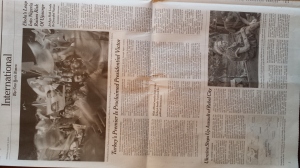Sometimes a contrast in coverage helps boldface the biases.
The New York Times (for some reason) wrote quite glowingly of Prime Minister Erdogan of Turkey during presidential elections in August 2014. Some of the choice language on August 9 before the election included:
- “hoping to secure a legacy greater than that of the revered founder of modern Turkey”;
- “broken down secular taboos”;
- “economic policies have improved the lives of many”;
- “long been a strategic ally of the United States”;
- “In 2011, President Obama developed a close personal relationship with Mr. Erdogan, seeing Turkey as a model to emulate for countries upended by revolution’”
After the elections, on August 11 the Times continued to use positive expressions: “thousands massed…and erupted in applause” to Erdogan’s victory, while caveating later in the article that there were some concerns among the country’s “liberals” about an “authoritarian” streak in Erdogan.
In both articles, the New York Times neglected to remind readers of a few policies of Erdogan over the prior year that gave Turkish citizens pause about Erdogan:
- Turkey jailed the most journalists in the world in both 2012 and 2013;
- Erdogan banned Twitter;
- Erdogan outlawed YouTube;
- Erdogan blocked kissing in public and sale of alcohol at night;
- Erdogan took to anti-Semitic rants comparing Israel to Nazi Germany
But if the New York Times likes you, certain facts will fade to the background.
Consider the surprisingly low-turnout for this first-time Turkish presidential election: only 74% came out to vote compared to 87% in 2011 general elections. The NYT said that few people showed up to vote “presumably because many had assumed Erdogan would win”. Erdogan squeaked out a win with 52% of the vote compared to the second place winner at 38% – only 37% higher. However, the NYT said “the election felt like a coronation”.
By way of comparison, look at the way the Times covered the election of Israeli Prime Minister Benjamin Netanyahu in January 2013. The Times did not include any of the commentary used for Turkey about Israel: being a strong US ally; the strong economy of Israel; the island of stability in the sea of chaos of the Middle East. Instead, the headline read: “Tepid Vote for Netanyahu in Israel Is Seen as Rebuke”. In that “tepid vote”, Israelis came out in numbers greater than ever before – 67% voted for the cabinet, compared to the 2009 election turnout of 65% and of 63% in the 2003 election. Not only was the vote not “tepid”, but Netanyahu’s Likud party won the vast majority with 31 seats compared to the second place winner, Yesh Atid, with 19 votes – a margin of 63% (almost twice Erdogan’s clearance).
But the Times despises Netanyahu. The article had remarkable quotes for the victorious Prime Minister:
- “weakened Prime Minister Benjamin Netanyahu”;
- “the outcome was a humbling rebuke”;
- “Mr. Netanyahu posted a panicky message on Facebook”;
- “The results were a blow to the prime minister, whose aggressive push to expand Jewish settlements in East Jerusalem and the West Bank has led to international condemnation and strained relations with Washington.”
This last quote is a particularly embarrassing and revealing lie. Jodi Roduren (who wrote the piece from the fantasy of her head instead of based on facts) sought to lay out a scenario where the Israeli public disagreed with the “aggressive push to expand Jewish settlements”. In the real world, both the number two party, Yesh Atid (19 seats) and the number four party, Jewish Home (11 seats), were in favor of a united Jerusalem and continuing to build homes for Jews in Judea & Samaria. The Jewish Home party campaigned on the basis of annexing Judea & Samaria. The Times’ favorite parties, the left-wing parties of Hatnua and Meretz came in almost last place with 6 seats each. (If you’re counting at home, that’s 61 seats versus 12 seats for the parties that want to keep united Jerusalem- a margin so large and bold you would think Roduren’s handlers could have managed to edit her “news” article).
The Times ignored reality in both situations. In Turkey, it failed to report on Erdogan’s strong right-ward shift into deep Islamic camp and painted him as more of a moderate. His modest win as blown out of proportion.
For Israel, Netanyahu’s strong win was considered poor. The country’s support of his policies about the rights for Jews to live all parts of Judea and Samaria were not just dismissed, but painted in a way that was completely opposite of the facts.
I sometimes think of the Times the way I think about turkey: it tastes quite good but it puts a person to sleep. Oh, and of course, it is one of the dumbest animals on the planet.
Sources:
Turkey, most journalist jailed 2012 and 2013: http://cpj.org/reports/2013/12/second-worst-year-on-record-for-jailed-journalists.php
Erdogan banned twitter May 2013: http://www.washingtonpost.com/news/morning-mix/wp/2014/03/21/turkey-bans-twitter-and-twitter-explodes/
Erdogan blocked Youtube: http://www.cnn.com/2014/03/27/world/europe/turkey-youtube-blocked/
Turkey ban kissing in public; late sale alcohol: http://www.bbc.com/news/world-europe-22780773
Netanyahu headline “Tepid Vote for Netanyahu in Israel Is Seen as Rebuke”: http://www.nytimes.com/2013/01/23/world/middleeast/israel-votes-in-election-likely-to-retain-netanyahu.html?pagewanted=all&_r=0
Lapid, Yesh Atid: Jerusalem not for negotiation http://www.jpost.com/Diplomacy-and-Politics/Lapid-Jerusalem-is-not-up-for-negotiation-because-the-city-will-never-be-divided-330680



Pingback: Pope Francis in Turkey | FirstOneThrough
Pingback: The Churlish Turkish Leadership | FirstOneThrough
Pingback: My Terrorism | FirstOneThrough
Pingback: The New York Times Large Propaganda Piece for Israeli Elections | FirstOneThrough
Pingback: Actions and Adjectives: Cluster Bombs | FirstOneThrough
Pingback: Obama’s Friendly Pass to Turkey’s Erdogan | FirstOneThrough
Pingback: Turkey’s Erdogan Likely Sending Military Towards Gaza | FirstOneThrough
Pingback: Is Hungary Evil or Saintly? | FirstOneThrough
Pingback: Turkey’s Hajj of Hypocrisy | FirstOneThrough